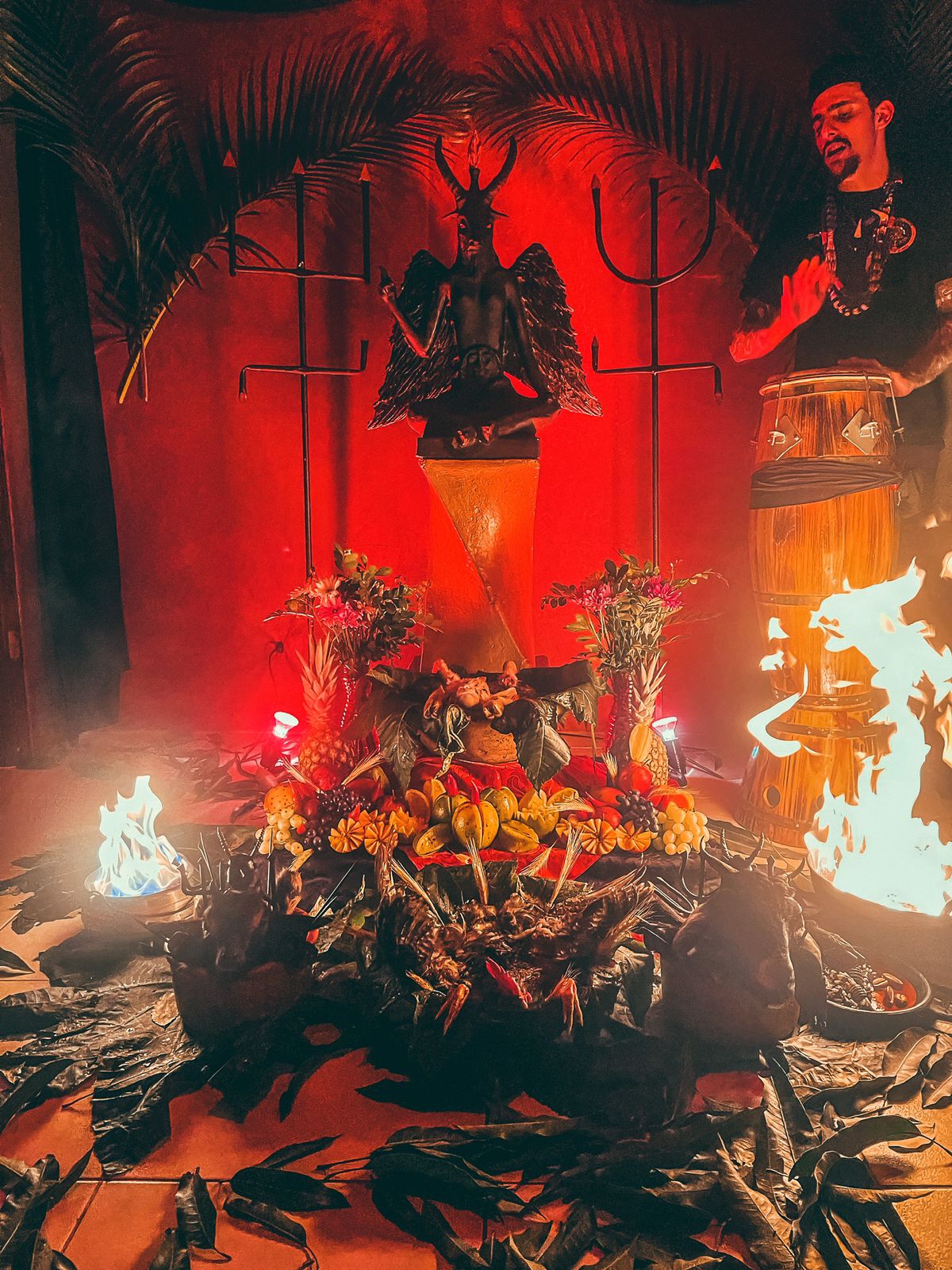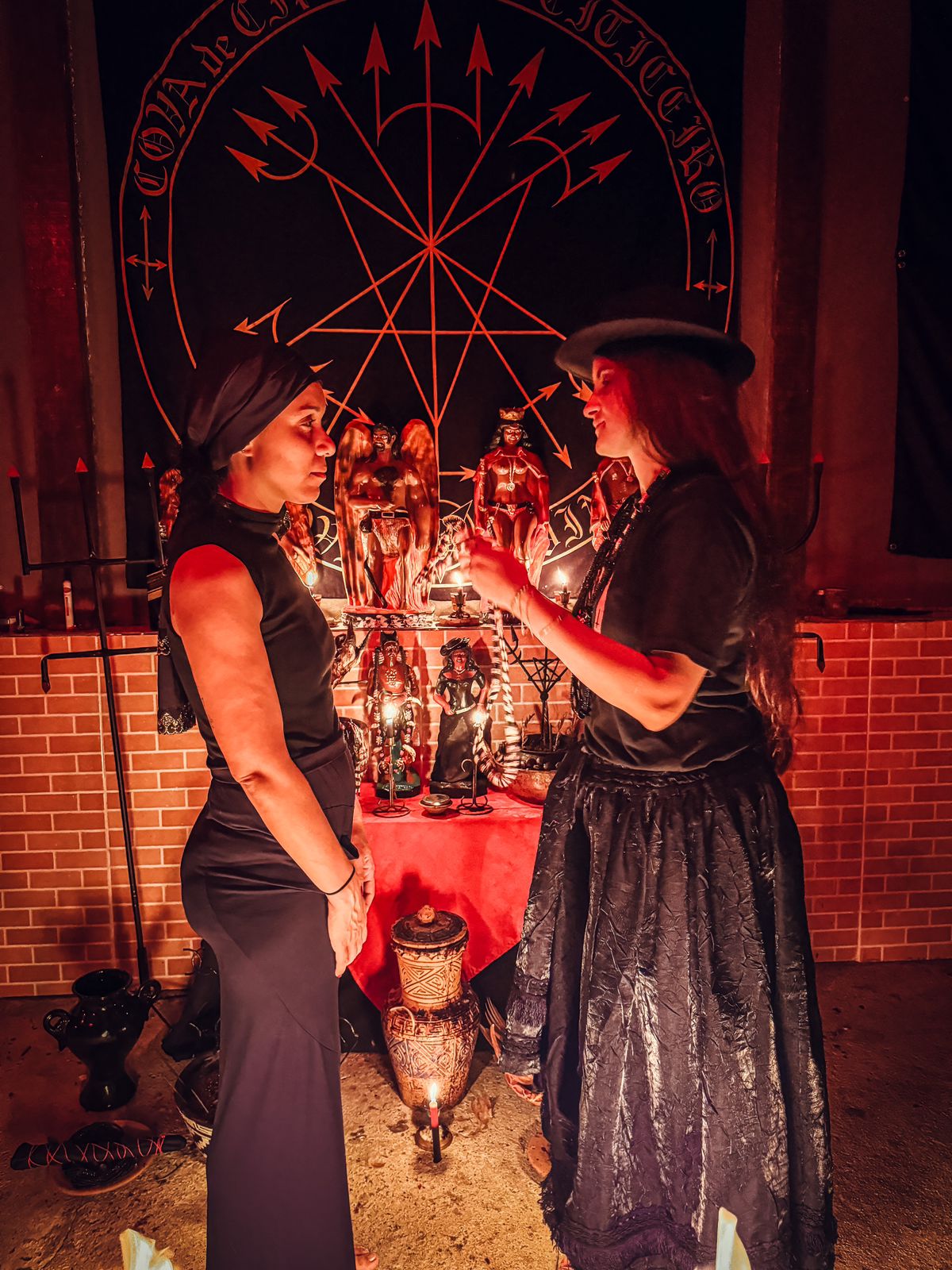Quimbanda

Quimbanda (Portuguese pronunciation: [kĩˈbɐ̃dɐ]) is an Afro-Brazilian religion practiced primarily in the urban city centers of Brazil. The religion borrowed many aspects of other traditions, especially Umbanda and Candomblé.
Quimbanda focuses on male spirits called exús as well as their female counterparts, pomba giras. Pomba giras are often regarded as the spirits of deceased women who worked as prostitutes or in other positions traditionally considered immoral in Catholic Brazilian society.
Quimbanda's practices are often focused on worldly success regarding money and sex. The religion shares much of the philosophy of LaVeyan Satanism, although it is more focused on the invocation of spirits.
Etymology
Historically, the term "Quimbanda" has been used by practitioners of Umbanda, a religion established in Brazil during the 1920s, to characterize the religious practices that they opposed.
The term Quimbanda came from the Kimbundu word kimbanda meaning "healer" or "magician." In the 1800s, the word became synonymous with witch-doctors in Africa.
Practitioners are called Quimbandeiros.
History
Before Quimbanda came to exist as a unique religion, many of the rituals and techniques later practiced by followers existed in some form inside the religious tradition of known as Macumba. During the late 19th century and into the mid 20th century, Macumba was a pejorative term for all religions deemed by the white-dominant class as primitive, demonic and superstitious black magic. However, as African culture continued to blend with the native Brazilian culture, the religious practices which had been termed Macumba gradually morphed into a loosely-organized new religious movement called Umbanda.
Lourenço Braga
By the 1940s, Umbanda had become more structured, with the formation of numerous churches and a national organization which provided guidance, but not leadership to the regional churches, which remained independent. Among those Umbandists who wished to bring increased organization and formality to the religion's practices was Lourenço Braga, an author and Umbandist who studied under Zélio de Moraes, a medium who is widely regarded as having founded Umbanda as a new religion in 1918.
Braga began collecting as much information as he could about Umbanda rituals, traditions, and beliefs with the goal of writing a fiction novel to explain these practices and the importance of Umbanda to the greater population of Brazil. His debut novel, Os Mistérios da Magia (The Mysteries of Magic), published in 1940, was a romance novel which told the story of two rich, white Brazilian siblings who are tormented by evil magician practicing a form of African black magic called Quimbanda. The novel establishes Quimbanda as the evil opposite of everything good in Umbanda.
The following year, at the First Congress of Umbanda Spiritism in Rio de Janeiro, Lourenço Braga presented a cosmology of magic divided into three parts:
- Spiritualism - Neutral magic
- Umbanda - Good magic
- Quimbanda - Evil magic
After receiving a positive reception from his fellow Umbandists, Braga expanded his text into a book published in 1942, Umbanda e Quimbanda. This text was not fictional, but intended as a practical guide and textbook study of magic religious practices from the Umbandan point of view. In addition to popularizing and formalizing Umbandan rituals, the book had a side-effect of spreading the rituals and philosophies of Quimbanda as well.
Contemporary period
In the 1970s, inspired by the rise in Satanism in America, Quimbanda rapidly grew into its own religion with unique traditions. The foundation of these practices were derived from Braga's books, but contemporary followers have also borrowed from the works of Anton LaVey, Aleister Crowley, and other modern occultists.
Beliefs
Quimbanda is a spirit-mediumship religion. Its rituals focus on spirit mediums "incorporating", or being possessed by, various ancestral spirits. In distinction from Umbanda, it focuses on interactions with "spirits of the street," namely exús and pombagiras but also, since the 1970s, ciganos.
Particular elements of an exú ritual remain unchanged in the pombagira ritual because the pombagiras are direct female counterparts of exús.
Exús
In Quimbanda the male spirits are known as exús, they are considered very powerful spirits. The name for this category of spirits was borrowed from the deity Exu. Exús refers to the "phalanx" (legion) of spirits.
Exús, commonly referred to as "spirits of the left," are not purely evil. Instead, they are more human-like in their qualities and share in human weaknesses. Exú spirits primarily deal with human and material matters as opposed to the "spirits of the right" used in Umbanda, who deal with primarily spiritual matters. Exús are typically called for rituals to arrange rendezvous, force justice, or keep life balance.
Quimbanderos instead affirm that exús have a stern and high morality, but they are comfortable helping people with delicate matters like seduction and vengeance, but never with the uninterest in morality and ethic often attributed to them by outsiders.
Pombagris
The female counterparts of the exús, pombagiras are regarded as the spirits of immoral women such as prostitutes. These spirits are linked to marginal and dangerous places, they are associated with sexuality, blood, death, and cemeteries. They are often presented as being ribald and flirty, speaking in sexual euphemisms and double entendres. They wear red and black clothing, and only possess women and gay men, who will then often smoke or drink alcohol, using obscene language and behaving lasciviously.
The term pombagira may derive from the Bantu word bombogira, the name of a male orixá in Candomblé's Bantu or Angola tradition. In Brazilian Portuguese, the term pomba is a euphemism for the vulva.
Rituals
Animal sacrifice, generally avoided in Umbanda, is common in Quimbanda as it is in many Afro-Brazilian religions. Species sacrificed include pigeons, chickens, goats, sheep, and bulls.
A Quimbanda ritual, called a trabalho, typically consists of several parts:
- a motive, dedication to a spirit
- a marginal location
- the metal or clay (earthy) materia
- an alcoholic drink, scent, and food (usually a peppered flour-palm oil mixture, sometimes called miamiami)
Songs that Quimbandistas sing for the deities are commonly called pontos.
Marginal locations
"Marginal locations" refer to areas containing magical and spiritual significance where rituals are executed. Many Quimbanda rituals are performed at crossroads, as Exu is the Lord of the seven crossroads and Ogum is the Lord of the center of the crossroads.
Other marginal locations include:
- Streets at night
- Cemeteries
- Beaches
- Forests
Initiation
Quimbanda is an initiatory religion with grades that practitioners progress through as they gain experience and knowledge in the traditions and customs.
0° Degree - Probationer
A Probationer is someone who has sought initiation into a Quimbanda group and has been accepted. The Probationer is presented with a study program, which involves an assessment of knowledge upon completion. A stay of only nine months is permitted in the Probationer Degree. At the end of the probationary period, after completing the study program and having passed the final assessment, the Probationer can undergo the baptism ceremony and become a Novice, Degree I°.
Degree I° - Novice (Baptized)
After completing the probationary period and having undergone the baptism ceremony, the Novice begins a journey of magical exploration through the Kingdoms of Quimbanda through the crossings, where he will acquire familiarity with the exús of Quimbanda and will pay full devotion to the Chief Império Maioral and his tutelary exú. This is a period of adaptation and adjustment to the magical-chthonic forces of Quimbanda.
Grade II - Kimbanda (Initiate)
Having adapted to the magical power of Quimbanda, the Novice is accepted into the initiation ritual; it is from this moment that he will be linked to Quimbanda and his tutelary exú through a diabolical pact. From this moment on, the katabatic journey of the Kimbanda begins, who will seek, through the process of mediumistic and magical development, to get closer to and create permanent bonds with his tutelary exú.
Grade III - Nganga (Priesthood)
Having received all the àṣẹ required for the priesthood, and having demonstrated priestly aptitude, the Kimbanda becomes a Nganga, a Priest of Quimbanda, and can offer magical services.
Degree IV° - Táta or Mameto (Master)
Having demonstrated the necessary aptitude, honor and loyalty, the Nganga becomes a Táta Nganga, a Master of Quimbanda. Having acquired spiritual authority and authorization through mastery, the Táta Nganga can initiate other adepts into Quimbanda.
Relationship with Umbanda
Quimbanda is closely related to Umbanda and the two have been regarded as "sister" religions. Umbanda represents the ‘whitened’ aspects of Macumba, drawing heavily on spiritual and hierarchical values of French Spiritism and Catholicism. On the other hand, Quimbanda represented the aspects of Macumba that were rejected in the whitening process, becoming "the Macumba of Macumbas."
The split between the black and white magic of Macumba has caused much debate over the unity or disunity of Quimbanda and Umbanda. Some believe that Quimbanda and Umbanda represent aspects or tendencies of a single system.
Umbandist leaders openly disavow practices they consider barbaric or primitive which belong to Quimbanda. For the early Umbandistas, Quimbanda represented a repository for all the opprobrious associations from which they wished to escape. Given that Umbanda places focus on combating the harmful influences of exús, a common saying among Umbandistas is that "if it weren't for Quimbanda, Umbanda would have no reason to exist."
The boundaries between Umbanda and Quimbanda are nevertheless not always clear, with various spirit mediums engaging or promoting practices associated with both.
Contemporary view
According to Brazil’s 2000 census less than 1% of the population claimed to belong to Afro-Brazilian religions (including Quimbanda and Umbanda). Although very little of the Brazilian population claims to follow Quimbanda, many people from all social ranks use Quimbanda rituals occasionally. It is a common practice for businessmen to consult exús before major business dealings.
Quimbanda has been criticized and opposed by various groups in Brazilian society. Animal rights groups have objected to its practice of animal sacrifice. Spiritists maintain that Quimbandistas are drawing low spirits into the material realm, while Pentecostalists and other Christians have regarded Quimbanda as being in service of the Devil.
